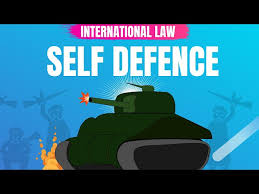FnF News
🌍 FNF News | International Law & Global Power Politics
Published: June 14, 2025 – By Khadija Khan, International Law Correspondent
“Your Right to Self‑Defence Depends on Whose Side You’re On”: Global Outcry Over Article 51 Double Standards
🇮🇷 Iran’s Article 51 Response Declared Valid but Ignored
Following Israel’s April strike on the Iranian consulate in Damascus—a diplomatic target, with multiple IRGC commanders killed—Iran invoked Article 51 to justify its drone and missile retaliation. Foreign Minister Abbas Araghchi cited the Charter, condemning the consulate attack as a “grave violation of Iran’s sovereignty,” and asserting Tehran’s “inherent right to self-defence” (quincyinst.org, theguardian.com).
Yet, when the UN Security Council convened on June 13, Iran’s envoy accused the U.S. of enabling the Israeli strike—charges met with harsh U.S. rebuttals (reuters.com). Meanwhile, most Western governments sharply criticized Iran’s response, denouncing it as “dangerous escalation,” yet remained muted or silent on Israel’s initial attack .
Legal Realists Call Out Disparity
According to Dr. Mary Ellen O’Connell, international law clearly grants self-defence rights to all UN members—not just the powerful (cambridge.org). Similarly, Prof. Agnes Callamard notes Israel’s strike on a consulate constitutes an armed attack, triggering Iran’s Article 51 rights (cambridge.org).
But when Ukraine invoked Article 51 after Russia’s 2022 invasion, the U.S., EU, and UN supported it unanimously. When Israel cites the same right against Hamas or Hezbollah, Western media echo its justification. Conversely, when Iran, Palestinian groups, Yemen’s Houthis, or Ethiopia react to attacks, their actions are branded “illegal,” and their rights dismissed .
As Prof. Makau Mutua puts it: “A geopolitical caste system of international law” prevails—where legality is reserved for the powerful .
🌍 Global South: “Double Standards Are Killing Rule‑Based Order”
Governments such as Brazil, South Africa, China, Russia, and Pakistan have demanded equal application of international law, sending letters to the UN and formally backing Iran’s Article 51 claim (en.wikipedia.org).
African and Arab diplomats denounced Western reluctance to condemn Israel’s consulate strike while promptly censuring Tehran’s response. Nigerian Foreign Minister called out “double standards,” while Ireland’s Leo Varadkar criticized Europe’s contrasting stances on Ukraine and Gaza (en.wikipedia.org).
UN High Commissioner Volker Türk warned that such claim-based diplomacy is eroding universal human rights norms (reuters.com).
The Law Isn’t the Problem—The Politics Are
Article 51 states, “Nothing…impair the inherent right…if an armed attack occurs…until the Security Council acts.” It makes no exemptions based on political alignment (cambridge.org).
Yet, Reuters reports show diplomatic inertia on Israel’s bombing of Iran’s consulate, contrasted with unified Western condemnation of Iran’s retaliation .
As Quincy Institute analysts observe, the U.S. and its allies often invoke Article 51 selectively, prioritizing strategic alliances over consistent legal standards (quincyinst.org).
What This Means for International Law
- Credibility Crisis: When legality depends on who uses it, the UN Charter risks becoming a blunt instrument of power, not justice.
- Erosion of Multilateralism: Countries outside Western blocks increasingly reject the legitimacy of a rules-based order perceived as biased (en.wikipedia.org).
- Heightened Instability: If sidelined nations feel law no longer protects them, they may resort to force—and others may follow suit.
Final Word
The law may be clear: Article 51 applies universally. But in practice? It’s wielded unevenly—dissected by power, not principle.
As Prof. Callamard warns: without consistent enforcement, “the Charter becomes symbolic, not substantive,” and the world drifts toward fractured, ad-hoc norms.
Unless major powers commit to impartiality, even the UN itself risks becoming irrelevant to billions who see it as just another voice for the powerful.
Sources:
- Reuters: UN Security Council debate on Israel–Iran escalation (reuters.com)
- Reuters: Responses from Global South, including Pakistan, Russia, UK, etc.
- Quincy Institute report on U.S. legal hypocrisy
- Reuters: High Commissioner Turk on crumbling human rights consensus (reuters.com)
- Reuters: Double standards on Gaza vs. Ukraine (en.wikipedia.org)
- Cambridge & Leiden legal analyses on Article 51 (cambridge.org)

